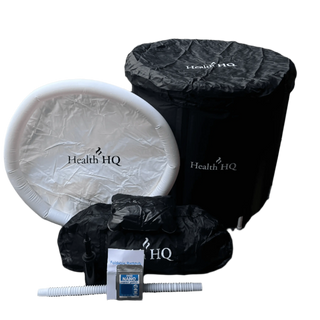Sleep is one of the most essential pillars of human health. Yet, in our modern world, many struggle to achieve the quantity and quality of sleep needed to function at their best. Just as you practice daily habits to maintain your physical health, your sleep requires attention too. The term “sleep hygiene” refers to the environment and behaviours that can influence the quality of your sleep. By optimizing your sleep hygiene, you can unlock deeper, more restorative rest, and enjoy the wide-ranging health benefits that come with it. Let's explore some key factors.
- Consistent Sleep Schedule
One of the most fundamental rules for healthy sleep is regularity. Our brain operates on a 24-hour cycle called the circadian rhythm, which governs not only sleep but numerous bodily processes. Going to bed and waking up at the same time every day—even on weekends—helps to anchor this internal clock. Inconsistent sleep patterns, such as staying up late on weekends and sleeping in, can disrupt this rhythm and lead to poor-quality sleep. Set a consistent bedtime and wake-up time, and try to stick to it as much as possible.
- Create a Sleep-Inducing Environment
The environment in which you sleep has a profound effect on your ability to fall asleep and stay asleep. Several factors come into play here:
- Temperature: Keep your bedroom cool, ideally between 15-20°C. Your body’s core temperature naturally drops as you sleep, and a cooler room facilitates this process.
- Light: Exposure to light—especially blue light from phones, tablets, and computers—interferes with the production of melatonin, the hormone that signals your brain it’s time to sleep. Try to minimize screen use at least an hour before bed, or use devices with night-mode settings.
- Noise: Silence is golden when it comes to sleep. However, if you live in a noisy environment, a white noise machine or earplugs can help drown out disruptive sounds.
- Comfort: Your mattress and pillows should be comfortable and supportive, tailored to your body and sleep preferences. Don’t hesitate to invest in high-quality bedding, as this can significantly improve your sleep.
- Avoid Stimulants in the Afternoon
Caffeine is the most widely consumed psychoactive substance in the world, and while its stimulating effects can boost alertness during the day, it can wreak havoc on your sleep if consumed too late. Caffeine has a half-life of around five to seven hours, meaning that a cup of coffee in the late afternoon can still be affecting your brain by bedtime. Aim to cut off caffeine consumption at least 6-8 hours before going to bed.
Similarly, nicotine is a stimulant that can disrupt sleep. While many people smoke or vape as a way to relax, nicotine increases alertness and makes it more difficult to fall asleep. Reducing or eliminating nicotine, especially before bed, can improve sleep quality.
- Be Mindful of Alcohol Consumption
Though alcohol is commonly thought to help with falling asleep, it actually fragments sleep and reduces the time spent in REM sleep, which is critical for emotional regulation and memory consolidation. Additionally, alcohol can relax the muscles of the throat, increasing the likelihood of snoring and sleep apnea. It’s best to avoid alcohol in the hours leading up to bedtime, or, if you do drink, do so in moderation.
- Develop a Relaxing Pre-Sleep Routine
The body needs time to transition from wakefulness to sleep. A relaxing bedtime routine can signal to your brain that it’s time to wind down. This routine should be free of stressful activities, such as checking emails or engaging in work-related tasks. Consider reading a book (preferably not on a screen), practicing relaxation exercises like deep breathing, or taking a warm bath. These activities can promote a sense of calm and help facilitate the sleep process.
- Get Exposure to Natural Light During the Day
Exposure to natural sunlight during the day helps regulate your circadian rhythm and boosts your alertness. Morning light, in particular, signals to your brain that it’s time to be awake and reduces levels of melatonin. Try to spend time outdoors during the day, especially in the morning, or open your blinds to let in natural light. If you have trouble getting enough sunlight, consider using a light therapy box to simulate natural light exposure.
- Limit Naps, Especially in the Afternoon
While naps can be beneficial, especially if you didn’t sleep well the previous night, long or late-afternoon naps can interfere with your nighttime sleep. If you do need a nap, aim to keep it short—20-30 minutes—and try to nap earlier in the day. This will help you avoid disrupting your sleep drive and ensure you’re tired when it’s time for bed.
- Exercise Regularly
Physical activity is another pillar of good sleep hygiene. Regular exercise improves the quality and duration of your sleep by reducing anxiety and increasing time spent in deep, restorative stages of sleep. However, timing matters—exercising too close to bedtime can elevate body temperature and adrenaline levels, making it harder to fall asleep. Ideally, try to finish vigorous workouts at least three hours before bedtime.
- Manage Stress and Anxiety
Stress and anxiety are among the most common sleep disruptors. Racing thoughts or worries can make it difficult to relax and fall asleep. Mindfulness techniques, meditation, or journaling before bed can help reduce pre-sleep anxiety. For those experiencing chronic sleep difficulties, cognitive-behavioural therapy for insomnia (CBT-I) is a highly effective treatment that targets both the mental and behavioural aspects of sleep disturbance.
Conclusion
Good sleep hygiene is the foundation for better, more restorative sleep. By adopting healthy sleep habits—such as maintaining a consistent sleep schedule, creating a sleep-friendly environment, and managing your caffeine and alcohol intake—you can significantly improve both the quality and duration of your sleep. Sleep is a non-negotiable biological necessity, and when prioritized, it enhances nearly every aspect of our physical, mental, and emotional well-being. So, let’s commit to making sleep a priority, because when you sleep better, you live better.
Ready to get started? Let’s talk about where you are on your journey and how we can work together to create balance in your health.








